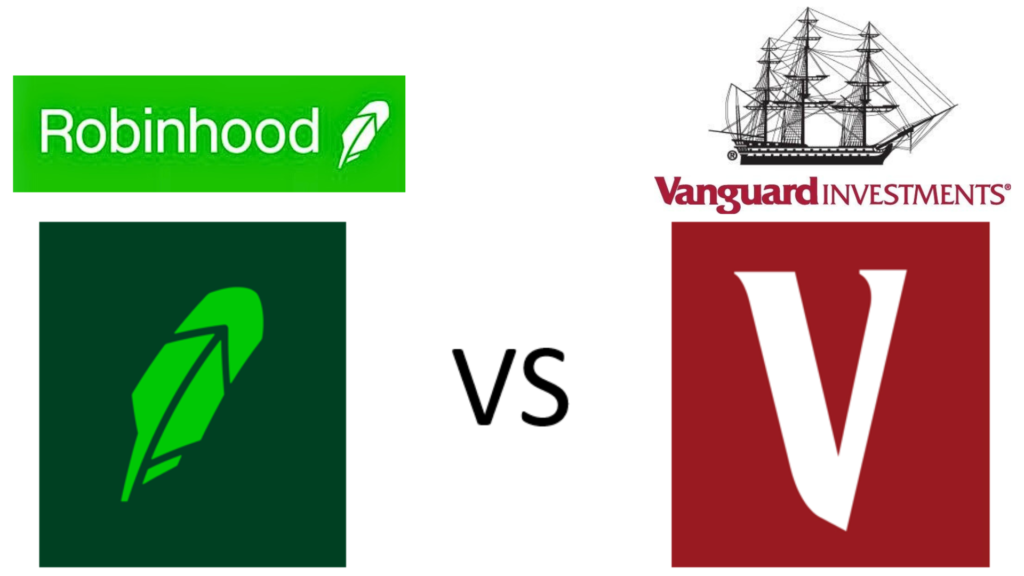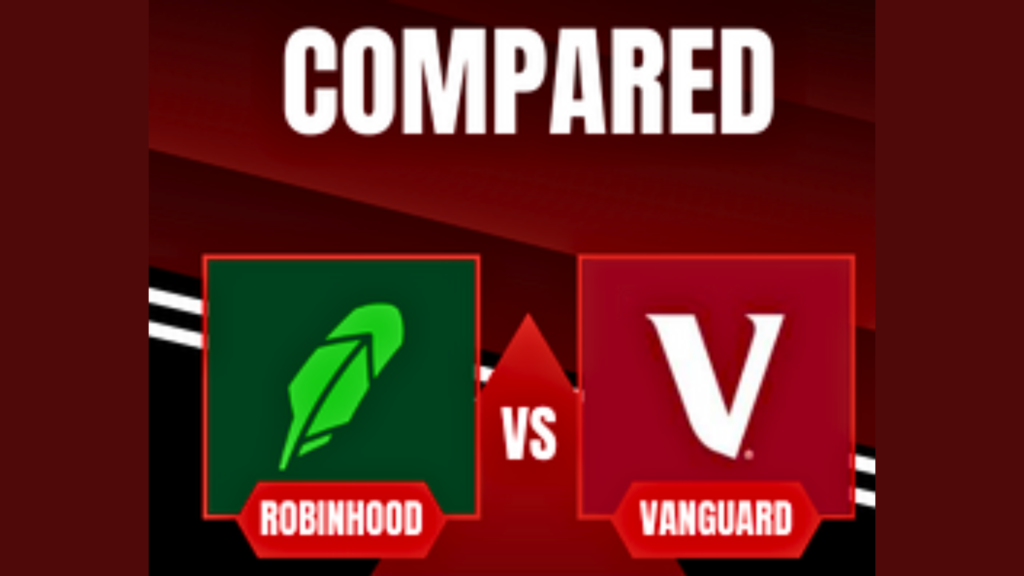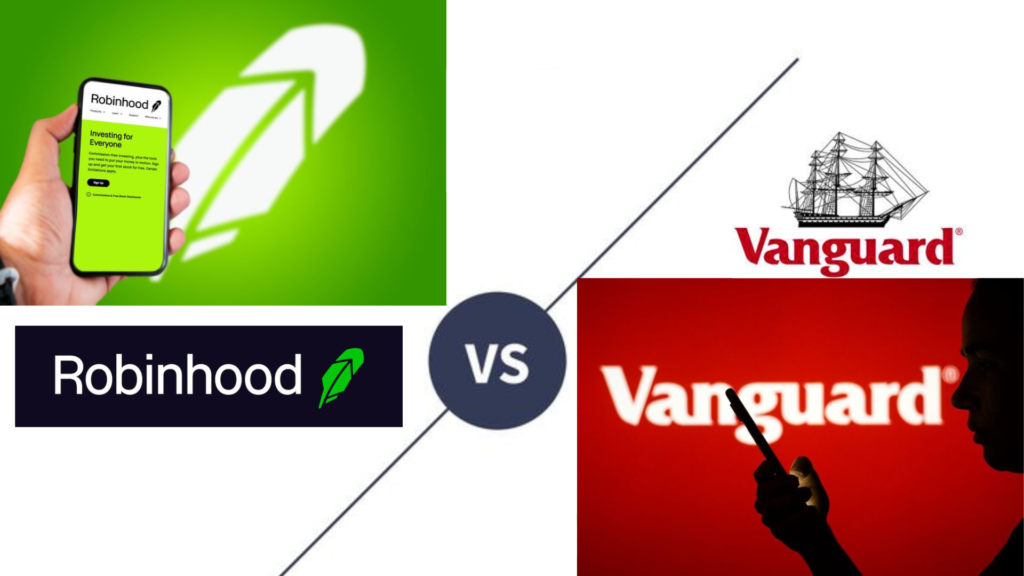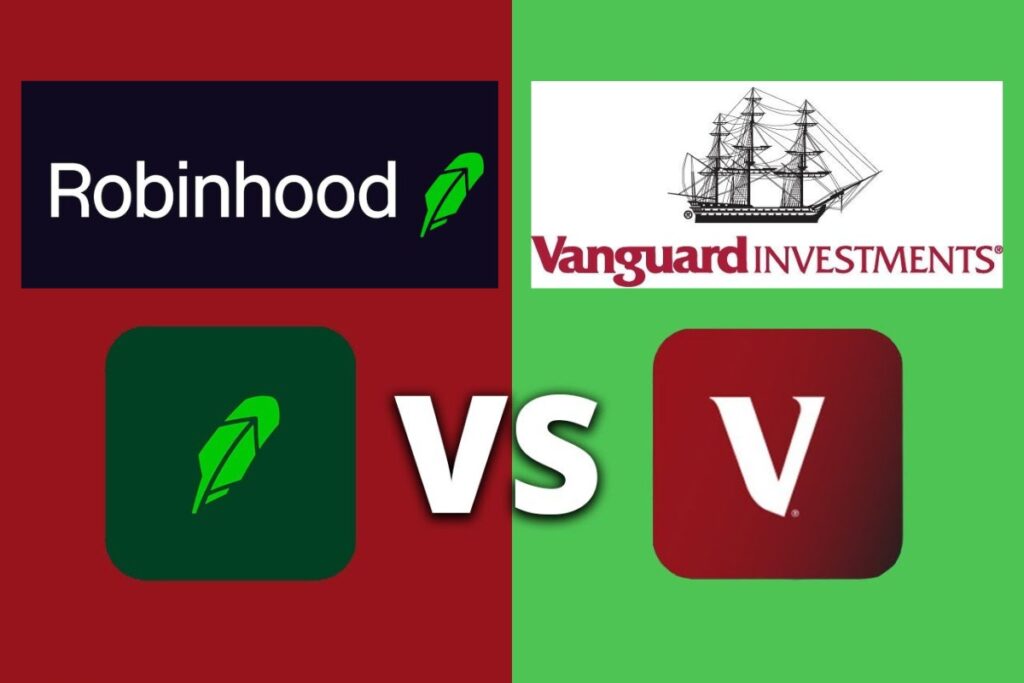Finding a suitable investment to add to your portfolio can be very challenging as an investor. But thanks to the rise of online trading platforms, investing in stocks, ETFs, and other financial products has never been easier. Two of the most popular options on the market today are Robinhood and Vanguard.
They each have unique features and attract different types of investors, but they also have their own advantages and disadvantages. To better understand, we will compare Robinhood vs. Vanguard and go over their features, fees, and services so you know which platform is best suited for your investment needs.
Robinhood vs. Vanguard: A Brief Overview
Before we jump into the comparisons, let’s first get an understanding of what each platform represents, what they offer and the pros and cons of Robinhood vs. Vanguard.
Robinhood
Robinhood is a user-friendly mobile app and web-based platform that was launched in 2013. It allows users to trade stocks, options, exchange-traded funds (ETFs), and even cryptocurrencies like Bitcoin and Ethereum without paying any fees.
It made commission-free trading very popular and attracted a younger, tech-savvy demographic. The company is also known for its free stock promotion, plus it offers a recurring investment feature that you can use to automatically fund your accounts and grow your investments over time.
Pros of Robinhood
- Free stock
- Recurring investments
- Trading is commission-free
- Cryptocurrency
- Extensive market exposure.
Cons of Robinhood
- Limited trading platform
- Poor customer support
- Limited capacity for research
- Platform for beginners, not for experienced users.

Vanguard
Vanguard, on the other hand, was founded in 1975 by John C. Bogle. The company remains one of the most reliable and affordable providers of individual stocks, mutual funds, index funds, retirement accounts, and education accounts.
The platform emphasizes long-term wealth building with low fees and is a popular choice for long-term investors who prefer a buy-and-hold strategy. Although Vanguard’s platform is a little more complex than Robinhood’s, it offers a wider selection of investment opportunities.
Pros of Vanguard
- Affordable investment options
- Solid research tools and customer support
- Some ETFs and mutual funds are free
- Trusted reputable brand.
Cons of Vanguard
- No extended-hours trading
- No foreign exchange market (FOREX)
- No cryptocurrency
- Fees on certain investments and accounts.
Now, let’s dive into the key differences between Robinhood vs. Vanguard, starting with trading fees.
ALSO READ: 5 Best Investments That Hedge Against Inflation
Robinhood vs. Vanguard: A Comparison of Fees
When it comes to trading fees, Robinhood and Vanguard differ significantly, which makes them better suited for different kinds of investors.
Robinhood Fees
One of the main selling points of Robinhood is its zero-commission trading. Whether you’re trading stocks, ETFs, or options, Robinhood does not charge you any fees. You can also trade cryptocurrency like Bitcoin and Ethereum without paying any commission.

Vanguard Fees
Vanguard is known for its low fees, even though it doesn’t offer zero-commission trading across board. Vanguard customers can trade Vanguard ETFs and mutual funds for free. However, for non-Vanguard investments, there are transaction fees that might range from $7 to $20 per trade depending on your account balance. The platform also charges fees for options trading.
So for those looking to trade frequently and at a low cost, Robinhood is the obvious choice in the trading fees department.
Robinhood vs. Vanguard: Services and Features Compared
Robinhood and Vanguard both offer different features that cater to different types of investors. Here’s how they compare.
Features and Services of Robinhood
- User Interface: The app is incredibly easy to use, which makes it a favorite among younger investors or those who are just starting out with investing.
- Cryptocurrency: Users can trade cryptocurrencies like Bitcoin, Ethereum, and Litecoin directly on the Robinhood platform.
- Options Trading: Robinhood allows users to trade options without paying any commission, which is a unique feature among free trading platforms.
- Funds Management: Robinhood offers a cash management feature that acts as a high-interest savings account, allowing you to earn interest on uninvested cash in your account.

Features and Services of Vanguard
- Investment Options: Vanguard offers an extensive range of investment options like stocks, bonds, mutual funds, ETFs, and more.
- Financial Advisors: Vanguard provides access to financial advisors who give you specialized tips and guidance to help you reach your financial goals.
- Retirement Accounts: When it comes to retirement accounts, Vanguard is an industry leader as it offers IRAs, 401(k) rollovers, and other long-term investment products.
- Education: Vanguard provides extensive educational resources to help investors understand the market, how to make smart financial decisions, and optimize their portfolios.
When it comes to services and features, it really depends on what you’re looking for. Robinhood is better for those interested in short-term trading and cryptocurrency, while Vanguard leads in retirement planning, long-term investing, and access to financial advisors.
ALSO READ: Top 10 Best Investments Opportunities for 2024
Who Should Use Each Platform?
Now that we’ve compared Robinhood vs. Vanguard across various categories, let’s discuss who would benefit most from each platform.
Robinhood for New and Active Traders
Robinhood is best for beginners, especially those new to investing and want a simple and easy-to-use platform. It is also a good choice for those who want to trade regularly without incurring costs. Also, it’s fee-free crypto trading makes it a desirable option for those who are interested in cryptocurrency.

Vanguard for Long-Term and Low-Cost Investors
Vanguard is the best option for those who want to invest for the long term and focus on building wealth over time. If you’re serious about saving for retirement, it’s a great option for you because of its focus on low-cost index funds and IRAs. Also, Vanguard is a good choice for those who need guidance managing their investment portfolio, as they provide investors with access to financial advisors. This is a significant plus.
Before choosing between these platforms, consider your investment goals. Robinhood might be a better option if you want to experiment with cryptocurrency or are a more active trader. Vanguard, however, will be a good choice if your goals are retirement and long-term wealth building. Both platforms have their advantages, so think carefully about what’s most important for your financial future.

